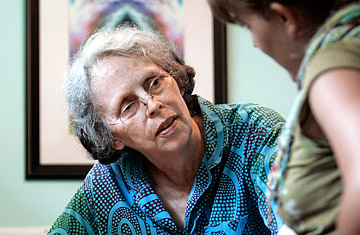
Ina May Gaskin
Ina May Gaskin started delivering babies in 1970 while on a hippie cross-country trip known as the caravan. She had no medical training, just a master's degree in English and a gut feeling that women deserved kinder, gentler births. When the hundreds of caravaners settled in Tennessee on what they called the Farm, Gaskin and several other women began delivering the community's babies at home and also opened one of the first, nonhospital birthing centers in the country. Word got around when Gaskin wrote about her successes in Spiritual Midwifery, and a movement was born.
Today, women still travel far and wide to give birth on the Farm, and Gaskin's methods have the respect of clinicians around the world (there is even an obstetric maneuver named after her). Now 71, she is credited with reviving what was essentially a dead profession in the U.S., inspiring scores of women to enter the field and helping found the Midwives Alliance of North America. But even while midwives attend more births in the U.S. — about 7.5% in 2008 — they're finding it increasingly hard to get practice agreements with doctors and hospitals. In her latest book, Birth Matters: A Midwife's Manifesta (Seven Stories, April 2011), Gaskin argues that America needs midwives more than ever.
You started attending births with no formal medical training. How did you know you could do it?
I knew how to deal with potential complications because kind doctors helped me. But basically I was behaving the way my aunt, who had a farm, would around any laboring mammal. You don't disturb her, you don't upset her. She deserves peace and quiet and respect. Doing that meant that no C-sections were necessary for the first 200 births on the Farm.
The C-section rate on the Farm is very low, under 2% for about 3,000 births, while the average in the U.S. for low-risk women is 20%. Can you explain?
It's very rare to see an undisturbed birth in a modern U.S. teaching hospital, but when you see a woman who isn't frightened, who's giving birth without interference, you stand back in awe and realize how little needed you are except in the rare circumstance. That doesn't mean that you shouldn't be around in case there is a problem. It just means that you should be able to tell when there's a problem, and you should be able to tell how not to create problems.
Singer-songwriter Ani DiFranco, who wrote the foreword to your new book, describes a very long and painful home birth.
Yes, she acknowledges how difficult it can be. But she also asks, Why are we so afraid of pain in childbirth? Why do women who choose unmedicated births get called masochists?
Why the title Birth Matters? Who are you trying to convince?
Lately, I've been thinking we really need to get men interested in birth. Because fathers-to-be have a very strong protective instinct, and we're not utilizing this well. Men instantly understand what I call "sphincter law." You don't try to defecate while lying flat on your back tied to various machines with somebody shouting at you! Why do we, then, continue to treat women as if their emotions and comfort, and the postures they might want to assume while in labor, are against the rules?
I almost felt like you wanted to call this book Midwives Matter.
If birth matters, midwives matter. In Europe, there are hospitals where the cesarean rate is less than 10%, and you'll find midwives in these hospitals, you'll see a lot less re-admissions with infections and complications, and you'll see a lot less injury to mothers.
And yet it seems like U.S. hospitals are constantly cutting off midwifery practices.
It's getting a lot worse, in fact. There's still a lot of hostility toward midwives.
Do you talk this frankly to obstetricians when you give grand rounds at major hospitals? Do they take offense?
A lot of OBs aren't happy about the high cesarean rate either. Malpractice-insurance companies have become the boss of obstetricians. It used to be that OBs were taught skills to deliver twins and breech babies vaginally. Now all they can really offer is surgery. If you're a woman who would like to have a breech birth vaginally in this country, you'll probably have to find a midwife. When I go into hospitals, I talk about how we do things on the Farm. I love talking to OBs. We midwives and physicians have a lot to teach each other.
